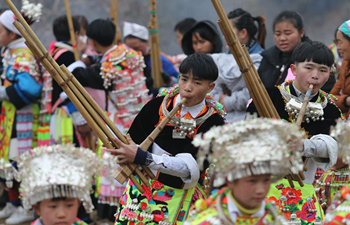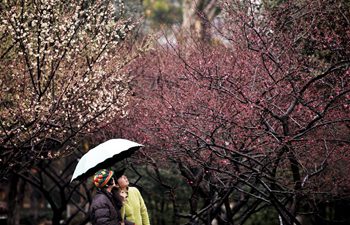 ?
?Smoke rises from the rebel-held Eastern Ghouta, east of Damascus, capital of Syria, on March 2, 2018. The Syrian aircraft continued to drop leaflets over the rebel-held Eastern Ghouta on Friday, encouraging civilians to leave and armed militants to lay down their weapons. (Xinhua/Ammar Safarjalani)
DAMASCUS, March 2 (Xinhua) -- The Syrian aircraft continued to drop leaflets over the rebel-held Eastern Ghouta on Friday, encouraging civilians to leave and armed militants to lay down their weapons.
According to the footage released by the Syrian army, its aircraft dropped leaflets over the sprawling Eastern Ghouta enclave in the eastern countryside of the capital Damascus.
Some of the leaflets include small maps showing safe exits out of Eastern Ghouta with instructions on how to leave, while others urge the armed militants to lay down weapons to gain a presidential pardon for those who turn themselves in.
All this comes as the Russian-backed humanitarian pause in Eastern Ghouta continued for the fourth day without achieving the intended goal of the evacuation of civilians from the region.
The state-run media outlets in Syria said no civilians have left so far, accusing the rebels in Eastern Ghouta of preventing people from leaving.
However, the Syrian Arab Red Crescent said it evacuated two Pakistani civilians, a man and his wife, from Eastern Ghouta on Wednesday.
On Friday, the Russian Reconciliation Center in Syria reportedly said two children succeeded in leaving Eastern Ghouta after midnight Friday through the designated humanitarian corridor in Wafidin area northeast of Damascus.
The center said Syrian soldiers monitored the movement of the two children and covered their evacuation as the rebels fired at them while they were leaving.
The two children are being offered psychological help, it added.
On Feb. 24, the UN Security Council adopted Resolution 2401, which requires all parties in Syria to immediately cease clashes and provide a sustained humanitarian break for at least 30 days across the country.
Two days later, the Russians demanded a daily humanitarian pause for five hours in Eastern Ghouta specifically.
All these initiatives, however, have only slightly reduced the number of rebels' mortar shells on the capital and the Syrian airstrikes and bombardment on Eastern Ghouta.
The pro-rebel London-based Syrian Observatory for Human Rights said no civilians were killed on Friday by the shelling in Damascus.
The people in the capital still prefer to stay indoors, particularly in the eastern Damascus' neighborhoods close to Eastern Ghouta.
With little improvement, the UN Human Rights Council decided to hold an urgent debate on the situation in Eastern Ghouta on Friday.
Meanwhile, the Syrian government has been alert to emerging information that rebels may stage a chemical attack against the army in Ghouta, according to state news agency SANA.
"Terrorist groups in Eastern Ghouta have received orders to use chemical weapons in the region to frame the Syrian army," the army said in a short statement late Thursday.
The rebels will use poisonous materials near frontlines with the Syrian army and will target civilians to draw condemnation from Britain, the U.S. and other Western countries, the statement noted.
In addition, the Syrian army also reaffirmed that the government has no chemical weapons and is not planning to obtain such weapons or using them.
The rebels in Eastern Ghouta previously accused the Syrian army of using chlorine gas in their attacks on the rebel-held region.
Western countries, such as the U.S. and Britain, have warned that they would respond with military action if the Syrian army is proven to have used chemical weapons in its attacks.
The UN organizations have already sounded the alarm about the situation in Eastern Ghouta, where 400,000 people are believed to be trapped in the sprawling area.
A couple of months ago, al-Qaida-linked groups launched an offensive against a key military base in the city of Harasta in Eastern Ghouta, prompting a counter-military offensive in the area.
These attacks were coupled with rebels' shelling of Damascus, while the government troops retaliated by launching airstrikes targeting rebel positions in Eastern Ghouta.
The situation has dramatically worsened in recent days, creating a humanitarian crisis that has attracted the international attention, as the life in Damascus' eastern neighborhoods near Eastern Ghouta has been largely paralyzed by heavy mortar shellings.
Eastern Ghouta has long been the major threat to Damascus, with rebels keeping launching attacks at the capital.
Four major rebel groups are currently positioned inside Eastern Ghouta, namely the Islam Army, Failaq al-Rahman, Ahrar al-Sham and the Levant Liberation Committee (LLC), otherwise known as the al-Qaida-linked Nusra Front.















